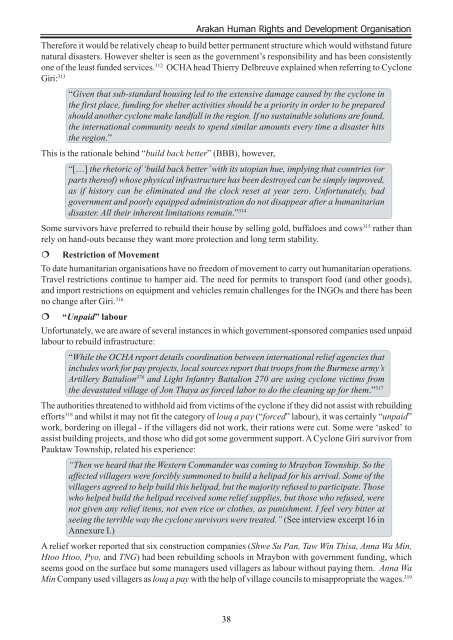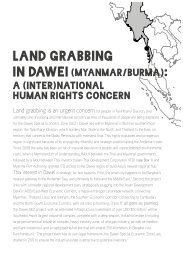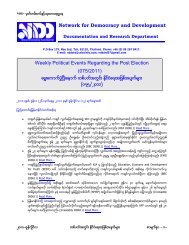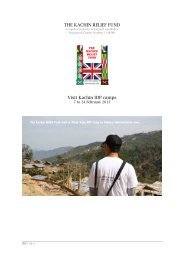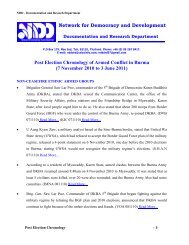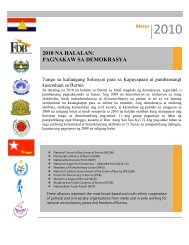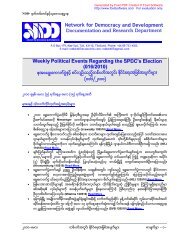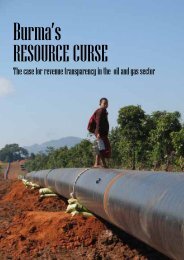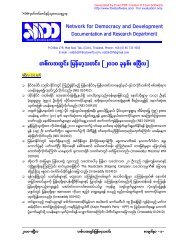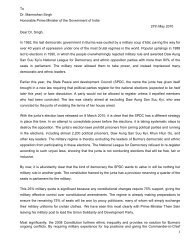Cyclone Giri - Two Years On - Burma Action Ireland
Cyclone Giri - Two Years On - Burma Action Ireland
Cyclone Giri - Two Years On - Burma Action Ireland
You also want an ePaper? Increase the reach of your titles
YUMPU automatically turns print PDFs into web optimized ePapers that Google loves.
Arakan Human Rights and Development Organisation<br />
Therefore it would be relatively cheap to build better permanent structure which would withstand future<br />
natural disasters. However shelter is seen as the government’s responsibility and has been consistently<br />
one of the least funded services. 312 OCHA head Thierry Delbreuve explained when referring to <strong>Cyclone</strong><br />
<strong>Giri</strong>: 313 “Given that sub-standard housing led to the extensive damage caused by the cyclone in<br />
the first place, funding for shelter activities should be a priority in order to be prepared<br />
should another cyclone make landfall in the region. If no sustainable solutions are found,<br />
the international community needs to spend similar amounts every time a disaster hits<br />
the region.”<br />
This is the rationale behind “build back better” (BBB), however,<br />
“[…] the rhetoric of ‘build back better’ with its utopian hue, implying that countries (or<br />
parts thereof) whose physical infrastructure has been destroyed can be simply improved,<br />
as if history can be eliminated and the clock reset at year zero. Unfortunately, bad<br />
government and poorly equipped administration do not disappear after a humanitarian<br />
disaster. All their inherent limitations remain.” 314<br />
Some survivors have preferred to rebuild their house by selling gold, buffaloes and cows 315 rather than<br />
rely on hand-outs because they want more protection and long term stability.<br />
Restriction of Movement<br />
To date humanitarian organisations have no freedom of movement to carry out humanitarian operations.<br />
Travel restrictions continue to hamper aid. The need for permits to transport food (and other goods),<br />
and import restrictions on equipment and vehicles remain challenges for the INGOs and there has been<br />
no change after <strong>Giri</strong>. 316<br />
“Unpaid” labour<br />
Unfortunately, we are aware of several instances in which government-sponsored companies used unpaid<br />
labour to rebuild infrastructure:<br />
“While the OCHA report details coordination between international relief agencies that<br />
includes work for pay projects, local sources report that troops from the Burmese army’s<br />
Artillery Battalion 376 and Light Infantry Battalion 270 are using cyclone victims from<br />
the devastated village of Jon Thaya as forced labor to do the cleaning up for them.” 317<br />
The authorities threatened to withhold aid from victims of the cyclone if they did not assist with rebuilding<br />
efforts 318 and whilst it may not fit the category of louq a pay (“forced” labour), it was certainly “unpaid”<br />
work, bordering on illegal - if the villagers did not work, their rations were cut. Some were ‘asked’ to<br />
assist building projects, and those who did got some government support. A <strong>Cyclone</strong> <strong>Giri</strong> survivor from<br />
Pauktaw Township, related his experience:<br />
“Then we heard that the Western Commander was coming to Mraybon Township. So the<br />
affected villagers were forcibly summoned to build a helipad for his arrival. Some of the<br />
villagers agreed to help build this helipad, but the majority refused to participate. Those<br />
who helped build the helipad received some relief supplies, but those who refused, were<br />
not given any relief items, not even rice or clothes, as punishment. I feel very bitter at<br />
seeing the terrible way the cyclone survivors were treated.” (See interview excerpt 16 in<br />
Annexure I.)<br />
A relief worker reported that six construction companies (Shwe Su Pan, Taw Win Thisa, Anna Wa Min,<br />
Htoo Htoo, Pyo, and TNG) had been rebuilding schools in Mraybon with government funding, which<br />
seems good on the surface but some managers used villagers as labour without paying them. Anna Wa<br />
Min Company used villagers as louq a pay with the help of village councils to misappropriate the wages. 319<br />
38


